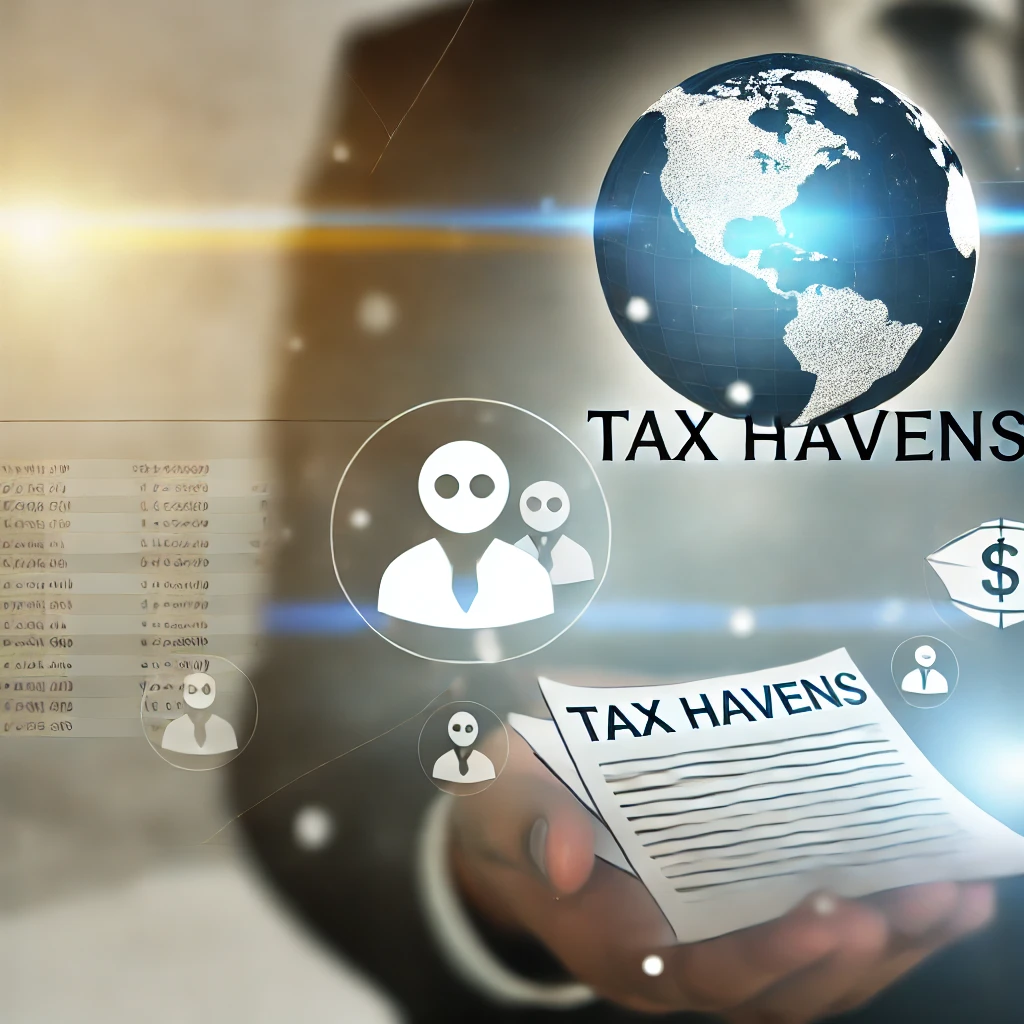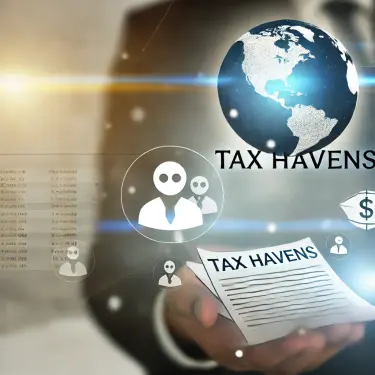- 1 1. What is a Tax Haven? Its Mechanisms and the Reasons for Increased Scrutiny
- 2 2. The Mechanics and Primary Uses of Tax Havens
- 3 3. Major Problems Associated with the Use of Tax Havens
- 4 4. Notable Cases and Scandals
- 5 5. International Regulations and Responses to Tax Havens
- 6 6. Relevance to Forex Automated Trading
- 7 7. Future Outlook and Challenges
- 8 8. Conclusion
1. What is a Tax Haven? Its Mechanisms and the Reasons for Increased Scrutiny
A tax haven is a country or region with extremely low or zero corporate and income taxes. Many of these regions have little to no corporate tax, which multinational corporations and wealthy individuals use to reduce their tax burden. Also known as “tax paradises,” there are an estimated 50 such regions worldwide, with the Cayman Islands, the Bahamas, Hong Kong, and Singapore being prominent examples.
Purposes and Users of Tax Havens
Tax havens are primarily used for the following purposes:
- Tax Mitigation: It is common for corporations and individuals to move assets and profits to tax havens to reduce a high tax burden.
- Investment Promotion: Some smaller countries and regions relax their tax systems to attract businesses and stimulate economic growth.
The Rise of Scrutiny and the “Panama Papers” Scandal
Global attention on tax havens surged dramatically with the “Panama Papers” scandal in 2016. This event exposed how numerous corporations and public figures were using tax havens for tax evasion. This revealed that tax havens were a hotbed for tax evasion and asset concealment, leading to widespread international criticism.

2. The Mechanics and Primary Uses of Tax Havens
A tax haven is a country or region that offers specific tax benefits, known as a place where multinational corporations and wealthy individuals manage and operate their assets. This section explains the basic mechanics of tax havens and their purposes.
Tax Havens: Characterized by Low or Zero Tax Rates
Many tax havens set their corporate and income tax rates at zero or a very low level. This allows multinational corporations and wealthy individuals to manage their assets with a far lower tax burden than in their home countries. For example, businesses can be established in the Cayman Islands or Bermuda with virtually no taxes, while cities like Hong Kong and Singapore also offer low-tax environments for asset management.
Primary Purposes for Using Tax Havens
Tax havens are often used for the following reasons:
- Tax Burden Reduction (Tax Avoidance)
Multinational corporations and the wealthy can lower their corporate and income tax burdens by moving profits to tax havens. For instance, it’s common for large corporations to transfer profits to a tax haven entity to reduce their tax liability in their home country. - Asset Protection and Anonymity
In tax havens, the true owners of companies are often not publicly disclosed, ensuring anonymity. By moving assets to a tax haven, individuals can protect them from various threats, not just from a tax perspective. Singapore and Switzerland, in particular, guarantee a high degree of confidentiality, making them popular choices for the wealthy to conceal assets. - Flexibility for Business Expansion through Relaxed Regulations
Some tax havens have very relaxed regulations and minimal government interference in business. This allows companies to conduct asset management and international transactions with greater flexibility, increasing their freedom for business expansion and investment.
The Current State of Tax Haven Usage
The use of tax havens is widespread, and it has been reported that many large Japanese corporations have also established subsidiaries in tax havens. This leads to a reduction in taxes that these companies should be paying in their home country, which in turn causes a decline in domestic tax revenue. Currently, many countries face social issues such as worsening public finances and growing wealth inequality due to capital flight to tax havens.
3. Major Problems Associated with the Use of Tax Havens
While tax havens can assist with tax avoidance and asset protection, they also cause several serious problems. This section explains the main issues arising from the use of tax havens.
Loss of Tax Revenue and Its Impact
The biggest problem with tax havens is the loss of crucial tax revenue for nations. When multinational corporations and the wealthy use tax havens to reduce their tax burden, taxes that should be collected in their home country are instead transferred abroad. This loss of tax revenue can lead to a shortage of funds needed for public services and infrastructure development, potentially impacting society as a whole. For example, there’s a risk of declining quality in education, healthcare, and social welfare programs.
Money Laundering and a Hotbed for Criminal Funds
Because anonymity is often guaranteed and financial transactions are opaque in tax havens, they are susceptible to becoming a hub for money laundering. There have been reports of criminal organizations and terrorists using tax havens to conceal funds, using shell companies and nominee accounts to hide the true nature of their financial transactions. This situation could lead to a decline in public safety and an increase in international crime, which is why global countermeasures are needed.
Widening Wealth Inequality
While tax havens provide a way for the wealthy and multinational corporations to reduce their tax burden, they also contribute to a significant gap between them and ordinary citizens. As large corporations and the wealthy accumulate assets while paying minimal taxes, the tax burden on ordinary citizens increases, and funding for social security and infrastructure falls short. Consequently, the use of tax havens is a major factor in widening income inequality and promoting economic disparity across society.
Global Criticism and Political Consequences
The “Panama Papers” scandal, made public in 2016, revealed that many politicians and companies were using tax havens, drawing global attention. The fact that top political figures and prominent corporations worldwide were involved in tax evasion and asset concealment shocked many citizens and prompted countries to introduce stricter regulations and countermeasures. The Panama Papers led to the resignation of politicians and increased public criticism of corporations, establishing the tax haven issue as a major challenge for the international community.

4. Notable Cases and Scandals
The use of tax havens has brought to light how many companies and public figures avoid their tax liabilities, leading to numerous internationally publicized scandals. This section introduces some notable cases and events.
The Panama Papers Scandal
A major event that brought the tax haven issue into the global spotlight was the “Panama Papers” scandal in 2016. A massive leak of internal documents from the Panamanian law firm Mossack Fonseca contained evidence that many prominent companies and wealthy individuals had used tax havens to conceal assets. The documents revealed that politicians and corporate executives worldwide were engaging in tax avoidance and asset hiding through tax havens, causing a major stir in the international community.
The Panama Papers exposed the involvement of many leaders, including Russia’s President Vladimir Putin, former UK Prime Minister David Cameron, and Iceland’s former Prime Minister, sparking protests and political turmoil in various countries. The Icelandic Prime Minister even resigned as a result of the scandal, which had a significant impact on international politics.
Tax Avoidance by Multinational Corporations
The use of tax havens has been widely reported as a means of tax avoidance, especially for multinational corporations. For example, major global companies like Starbucks, Apple, and Google have been publicly revealed to have used tax havens to transfer profits and reduce their tax bills. These companies set up subsidiaries in tax havens and move a portion of their sales and profits to these low-tax regions to lower their tax burden in their home countries. When it was revealed that Starbucks had avoided paying taxes in the UK for 14 years, it sparked a significant backlash among consumers and brought the issue to public awareness as a social problem.
Japanese Corporations and Tax Havens
In Japan, it is also known that major corporations establish subsidiaries in tax havens to reduce their tax burden. For instance, many large companies listed on the Tokyo Stock Exchange are said to have subsidiaries in tax havens and engage in tax avoidance. A 2013 report revealed that many major Japanese corporations held trillions of yen in assets in tax havens, leading to criticism that this practice contributed to a decline in domestic tax revenue. There was also a notable case where SoftBank was flagged for underreporting income after setting up a shell company in a tax haven.
5. International Regulations and Responses to Tax Havens
As concerns over tax revenue loss and money laundering via tax havens grow, countries and international organizations are strengthening their countermeasures. This section explains the key regulations and responses.
OECD’s BEPS (Base Erosion and Profit Shifting) Project
The OECD (Organisation for Economic Co-operation and Development) is spearheading the “BEPS (Base Erosion and Profit Shifting) Project” to prevent tax avoidance by multinational corporations. This project was launched to establish rules that countries can work together on to prevent tax avoidance, with the goal of effectively limiting the use of tax havens. A significant step toward global tax avoidance prevention was taken in 2021 with “BEPS 2.0,” which introduced a “Global Minimum Tax” setting a minimum corporate tax rate of 15%.
Transfer Pricing Taxation
Transfer pricing taxation is a system designed to prevent multinational corporations from reducing their tax burden by trading at unfair prices with their overseas subsidiaries. For instance, if a company and its subsidiary conduct transactions at an excessively low price to transfer profits to a low-tax country, this system applies. It ensures that transactions are taxed based on standard market prices if the pricing deviates significantly from the market rate.
Controlled Foreign Corporation (CFC) Rules
Japan and many other countries have introduced Controlled Foreign Corporation (CFC) rules, which impose strict tax regulations on low-tax subsidiaries established abroad. This system requires that the profits of a subsidiary in a tax haven with a corporate tax rate below 20% be combined with the income of its parent company in Japan, creating a tax obligation. This aims to curb tax avoidance and ensure a fair tax burden.
Increased Transparency in Financial Transactions
The automatic exchange of financial information among multiple countries is being implemented, with a system in place for financial institutions like banks to automatically share customer tax information. This initiative is expected to make it difficult to conceal assets through anonymous transactions or shell companies in tax havens. Specifically, based on the “Common Reporting Standard (CRS),” tax authorities in each country share financial institution data to monitor opaque capital movements.
The Importance of International Cooperation
International cooperation is essential to address the tax haven problem. Through frameworks like the OECD and G20, countries continue to work together to strengthen regulations and increase transparency. However, due to differing tax systems and economic conditions, finding a complete consensus is challenging. Therefore, while countries must collaborate, a flexible approach is also required moving forward.

6. Relevance to Forex Automated Trading
The issue of tax havens is also sometimes used as a means for tax evasion and asset concealment, especially in the trading of Forex and cryptocurrencies. This section explains the impact of relaxed regulations and high anonymity in tax havens on these fields.
Using Overseas Forex Brokers and Tax Issues
While strict tax reporting obligations exist for Forex trading in Japan, some individuals try to avoid them by using overseas Forex brokers based in tax havens. Forex brokers registered in tax havens often have high anonymity, and financial information is not shared with other countries, making it difficult to trace profits. For this reason, some investors use such brokers to manage their assets with the goal of gaining tax benefits.
The Relationship Between Automated Trading and Tax Havens
In recent years, the use of automated trading (Expert Advisors or EAs) has become widespread in Forex trading, allowing even individual investors to engage in algorithmic trading. When using brokers based in tax havens, there is a risk that the actual earnings may be concealed, which can be used as a means of tax evasion. A portion of transactions conducted through brokers in tax havens can be carried out without the capital movements or trading history being known to other countries, which makes it difficult to properly report profits.
Japan’s Response and Stricter Regulations on Tax Haven Use
Japan is also taking steps to counter the concealment of profits from Forex automated trading using tax havens. Tax authorities are working to understand the profits that domestic investors earn through tax havens by using Controlled Foreign Corporation (CFC) rules and the Automatic Exchange of Information (CRS). Information sharing is also advancing specifically for Forex transactions, with efforts being made to make tax evasion more difficult. For investors, it is essential to consider the tax risks when using overseas brokers.
7. Future Outlook and Challenges
The tax haven issue is more than just a matter of lost tax revenue; it’s also a concern from the perspectives of economic inequality and global crime prevention. While countries are strengthening regulations, challenges surrounding tax havens persist, and further action is needed in the future.
Regulatory Strengthening and Its Effects
International efforts to strengthen regulations, such as the OECD’s “BEPS Project” and the “Global Minimum Tax,” are progressing step by step. This is making it more difficult for multinational corporations and the wealthy to use tax havens for tax avoidance, but it’s not easy to prevent entirely. As each country’s tax system differs, corporations and individuals continue to seek loopholes.
New Methods for Using Tax Havens
New methods for using tax havens have emerged in recent years. For example, with the rapid spread of cryptocurrencies and digital assets, there’s a growing trend of managing these assets in tax havens in a highly anonymous way. The difficulty of tracing transactions via blockchain technology presents a new challenge for regulatory authorities.
Efforts and Challenges for Increased Transparency
To solve the problems surrounding tax havens, increased transparency among countries is crucial. The sharing of financial information through the Common Reporting Standard (CRS) is making it more difficult to hide assets in tax havens. However, as many tax haven jurisdictions are still hesitant to ensure transparency, achieving complete information sharing will take time.
The Importance of Balanced Regulation
Tax havens also have a role in attracting investment for economic growth, so there is a risk that excessive regulation could stifle economic activity. Moving forward, balanced regulations are needed to prevent tax avoidance and crime while maintaining the legitimate economic role of tax havens. It is especially important to have a system that allows multinational corporations and the wealthy to manage assets for legitimate reasons while also preventing fraudulent use.
8. Conclusion
While tax havens are used by multinational corporations and the wealthy to reduce their tax burden, they also cause serious problems such as loss of tax revenue, widening wealth inequality, and serving as a hotbed for money laundering. The “Panama Papers” scandal in 2016, in particular, brought the reality of tax haven usage to international attention, leading to increased criticism of tax avoidance and asset concealment.
Countries are advancing regulatory efforts, such as the OECD’s “BEPS Project” and transfer pricing taxation, to curb opaque transactions in tax havens. Additionally, information-sharing systems through the Common Reporting Standard (CRS) are being built to increase the transparency of financial transactions. However, since tax havens also have a legitimate economic role, a balanced response that avoids excessive regulation is needed going forward.
As surveillance and regulations regarding tax havens continue, the international community is expected to move toward a more transparent and equitable economic system.










